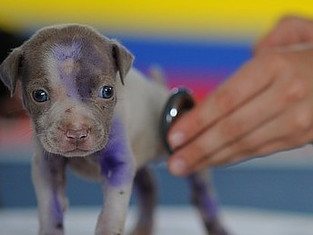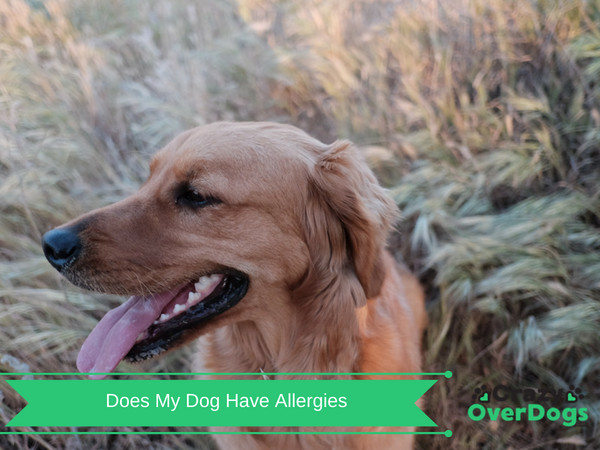Do you know if your dog has allergies is an important question for dog owners It needs to be answered and the important signs and symptoms recognized.
The content takes around 5 minutes to read, but if you are in a hurry, we have also included a table of contents below so you can see at a glance what the content is.
Dogs can have allergies, much the same as their owners. Unfortunately, an extreme reaction can result. It is their immune systems that recognize that certain everyday substances are dangerous to them.
Serious problems can arise if the allergens are ingested or inhaled or come in contact with your dog’s skin.
Make sure to check out today’s deals to SAVE money on dog products by clicking on the graphic below. Don’t miss out.
This post contains affiliate links and I will be compensated if you make a purchase after clicking on my links.
—————————
Table Of Contents
What Are The Common Symptoms Of Allergies:
- Sneezing.
- Itchy runny eyes.
- Skin that is red or scabbed.
- Hair loss.
- Diarrhea.
- Vomiting.
- Licking constantly.
- Paws that are swollen.
What Are The Common Substances Dogs Can Be Allergic To:

A few of the most common allergens are:
- Pollens from trees or grass.
- House and dust mites.
- Feathers.
- Perfumes.
- Cigarette smoke.
- Fleas.
- Rubber materials.
- Plastic materials.
- Certain fabrics.
- Cleaning products.
Are All Dogs At Risk Of Getting Allergies:
Yes, dogs can get allergies and also can be at risk of developing allergies. However, it has been found that certain breeds are more prone than others. They appear to be more common in Setters, Terriers, and Retrievers.
Do Dogs Get Allergic Reactions To Food:
The answer is yes, but generally, it takes some work to find out what is causing it. Food allergies generally show themselves in ear infections, which can be chronic. Other symptoms can include vomiting and diarrhea, plus itchy skin.
Generally, these allergies to a specific type of food, which can arise at any age, are found by a form of an elimination diet.
What To Do For A Dog With Allergies:

For all health issues, and this type of reaction can be quite dangerous, we always recommend that you contact your vet.
Generally, he will physically examine your dog and in most cases will also recommend blood and skin tests. This will help determine what is causing the reaction and discomfort to your pet.
If the allergy problem which is affecting the skin persists after the initial treatment by the vet, then another test called an intradermal skin test can be introduced. This is similar to what is conducted on humans.
In the case of a food allergy, the only way to determine what food is causing the problem is to have your dog go on what is called a hydrolyzed protein diet. This will require a period of around twelve weeks.
This type of diet will be totally free of any ingredients which can potentially cause an allergy. The pet will have to stay on the diet until the symptoms disappear. At this point, you can then introduce old foods and monitor which of the foods are causing the reactions.
How Are The Dog Allergies Best Treated:
Fleas:
They say that prevention is the best way to help with a cure. Therefore, it has been found that the best treatment is to actually remove the problem allergens from the dog’s environment.
In the case of fleas, introduce a control program for your pets before the season begins. Your vet can always help with advice.
Dust:
If the problem appears to be dust, then always vacuum and clean the dog’s bedding regularly. In addition, ensure that you clean areas, where dust might gather within the home.
Another tip to help relieve the itching is to bathe with the correct products which will help remove allergens and pollens from your dog’s skin. Please be aware that too much bathing can dry out the skin.
As mentioned above, if you suspect that your pet has an allergy because of food, then a hydrolyzed protein or prescription diet needs to be introduced, under the supervision of your vet.
Some allergens, such as those which are airborne, cannot be removed from the environment. In cases like this, the best approach would be allergy injections. As always, please consult your vet.
It has been found that supplements of fatty acid and specific shampoos can help to relieve itchy skin. You can also investigate sprays that contain natural products such as oatmeal.
In the case of fleas, there are great flea prevention products. which can be applied on a regular basis, until the problem is sorted.
Conclusion:
The main thing surrounding skin allergies is to please not ignore the signs, as it can develop into something far more serious. As always, if you are worried, talk to your vet.
A healthy pet brings great health benefits to its owner and it’s something that we do need reminding of. As always, we hope that the information has been of help to you on the important question. Do You Know If Your Dog Has Allergies?
—————————-
Related Articles:
Common Dog Allergies – It’s Important To Know
—————————-
Disclaimer: All material on this website is provided for your information only and may not be construed as medical advice. No action or inaction should be taken based solely on the contents of this information; instead, readers should consult appropriate health professionals or veterinarians on any matter relating to their dogs‘ health and well-being. The publisher is not responsible for errors or omissions.



What an important article regarding pet care! I think it is easy to get caught up in the “do’s and dont’s” and forget to simply observe what it is our pet is trying to tell us. Paying attention to their reactions is perhaps the most important thing that we can do to care for them! Thank you for writing this article – it is really informative!
Janani
Glad that you found the article helpful and informative
Dave